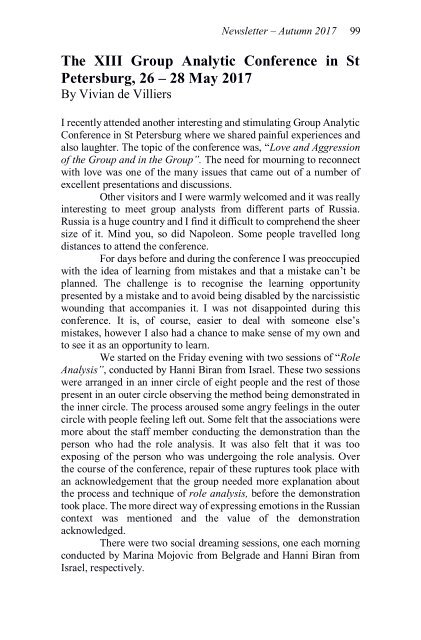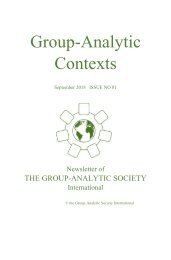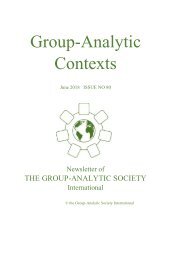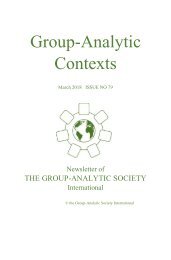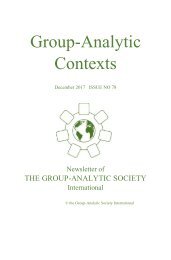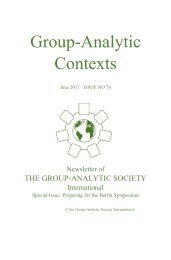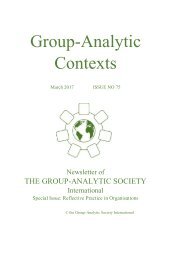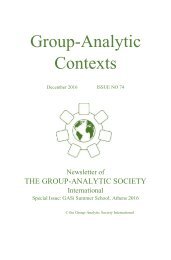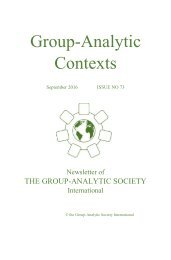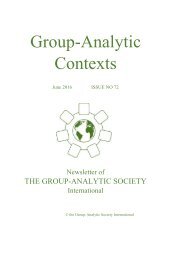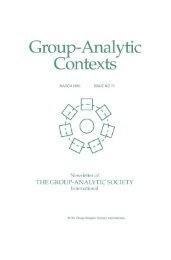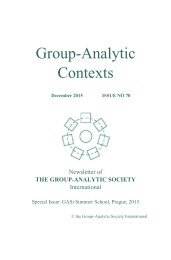Group Analytic Contexts, Issue 77, September 2017
Newsletter of the Group Analytic Society International
Newsletter of the Group Analytic Society International
Create successful ePaper yourself
Turn your PDF publications into a flip-book with our unique Google optimized e-Paper software.
Newsletter – Autumn <strong>2017</strong> 99<br />
The XIII <strong>Group</strong> <strong>Analytic</strong> Conference in St<br />
Petersburg, 26 – 28 May <strong>2017</strong><br />
By Vivian de Villiers<br />
I recently attended another interesting and stimulating <strong>Group</strong> <strong>Analytic</strong><br />
Conference in St Petersburg where we shared painful experiences and<br />
also laughter. The topic of the conference was, “Love and Aggression<br />
of the <strong>Group</strong> and in the <strong>Group</strong>”. The need for mourning to reconnect<br />
with love was one of the many issues that came out of a number of<br />
excellent presentations and discussions.<br />
Other visitors and I were warmly welcomed and it was really<br />
interesting to meet group analysts from different parts of Russia.<br />
Russia is a huge country and I find it difficult to comprehend the sheer<br />
size of it. Mind you, so did Napoleon. Some people travelled long<br />
distances to attend the conference.<br />
For days before and during the conference I was preoccupied<br />
with the idea of learning from mistakes and that a mistake can’t be<br />
planned. The challenge is to recognise the learning opportunity<br />
presented by a mistake and to avoid being disabled by the narcissistic<br />
wounding that accompanies it. I was not disappointed during this<br />
conference. It is, of course, easier to deal with someone else’s<br />
mistakes, however I also had a chance to make sense of my own and<br />
to see it as an opportunity to learn.<br />
We started on the Friday evening with two sessions of “Role<br />
Analysis”, conducted by Hanni Biran from Israel. These two sessions<br />
were arranged in an inner circle of eight people and the rest of those<br />
present in an outer circle observing the method being demonstrated in<br />
the inner circle. The process aroused some angry feelings in the outer<br />
circle with people feeling left out. Some felt that the associations were<br />
more about the staff member conducting the demonstration than the<br />
person who had the role analysis. It was also felt that it was too<br />
exposing of the person who was undergoing the role analysis. Over<br />
the course of the conference, repair of these ruptures took place with<br />
an acknowledgement that the group needed more explanation about<br />
the process and technique of role analysis, before the demonstration<br />
took place. The more direct way of expressing emotions in the Russian<br />
context was mentioned and the value of the demonstration<br />
acknowledged.<br />
There were two social dreaming sessions, one each morning<br />
conducted by Marina Mojovic from Belgrade and Hanni Biran from<br />
Israel, respectively.


